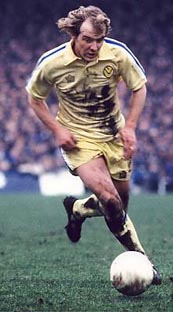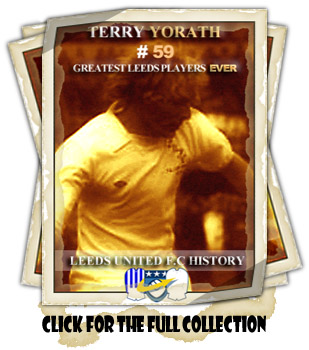

Yorath: Terence Charles (Terry)
1967-1976
(Player Details)
Midfield
Born: Cardiff: 27-03-1950
Debut: Burnley (a): 11-05-1968
5’10” 10st 12lb (1975)
#59 in 100 Greatest LUFC Players Ever

Yorath’s entry into soccer was quite by accident. He was more noted at school for his
ability as a Rugby Union scrum-half and had trials for Cardiff Schools at the handling game.
One day he went to watch his soccer-playing brother play for Cardiff Boys against Rhondda
Valley. The Cardiff lads were a man short and Yorath was pressed into service and did so
well that he went on to win four Welsh Schools caps at soccer. After turning down the two
Bristol clubs and his native Cardiff, Yorath joined Leeds. He turned professional in April
1967 and went on to win seven Under-Twenty-three caps. He only had one Football League
appearance under his belt when he won his first full cap in 1969. He waited patiently in the
Reserves and was converted from a rugged defender to an effective ball-winning midfielder.
Along with other Leeds midfield players of the time, such as Mick Bates and Terry Hibbitt,
he found it difficult to establish himself ahead of the preferred pairing of Billy Bremner
and Johnny Giles as well as Paul Madeley and Eddie Gray. Between 1967 and 1972 he made just
fourteen League appearances for Leeds. In the 1972–73 season, injuries and suspensions
allowed Yorath to establish himself as a first team regular. However, his first season ended
with two Cup Final runners-up medals. He was a substitute in the 1973 FA Cup Final, which
Leeds lost 1–0 to Sunderland, and also appeared in the 1973 European Cup-Winners’ Cup Final,
which Leeds lost in controversial circumstances to AC Milan. Yorath finally won some
silverware in the following 1973–74 season, where he was a key member of the Leeds
Championship-winning side. The 1974–75 season saw Leeds reach the final of the European Cup,
but again Yorath ended up with a runners-up medal as Leeds lost 2–0 to Bayern Munich, once
more in controversial circumstances. Yorath proved a fine clubman, but as a defensive
hard-tackling midfielder had to suffer a lot of barracking from supporters who saw him as
lacking the skills of his team-mates. He had twenty-eight full Welsh International
appearances to his name when he left Leeds for Coventry City in August 1976 for £125,000
after Don Revie had left Leeds to manage England, and his eventual replacement Jimmy
Armfield decided to dispense with Yorath's services. Yorath remained at Coventry for three
years, playing ninety-nine League games and scoring three goals and was their captain for
most of this period. Coventry sold him to Tottenham Hotspur for £300,000 in August 1979,
where he scored once in forty four League starts and four from the bench. He also made
fourteen appearances in the Cup competitions in his two seasons with the club. He had a
brief stay with Vancouver Whitecaps in 1981. He went to Bradford City as Player/Coach in
December 1982, making twenty-two League starts and five from the bench, before he hung up
his boots and helped Trevor Cherry build the Paraders into one of the most improved sides in
the country. In May 1986, Yorath was appointed Manager of Swansea City and in April 1988
began a successful trial for the vacant Welsh Managerial position. In February 1989 Yorath
walked out on Swansea City to become Bradford City’s new Manager. The move sparked off a
tremendous row between the two clubs over compensation and the Swans tried to block Yorath’s
path to Valley Parade with legal action. Things did not work out at Bradford, however, and
he left in March 1990, returning to his old job with Swansea within days and led the club to
promotion from the Division Four to the Division Three at the end of the 1987–88 season. He
was Swansea’s Manager until March 1991 and the following year he suffered a personal tragedy
when his fifteen-year-old son, Daniel, collapsed and died of an undiagnosed heart condition.
After his departure from Swansea he was made full-time Manager of Wales, having run the side
on a part-time basis since 1988, and he took them close to qualification for the 1992 European
Championships but his contract was not renewed in December 1993. Yorath joined Cardiff City
as General Manager in 1994, and assumed temporary charge of team affairs when manager Eddie
May was sacked. He then took over as coach of the Lebanon national team in 1995, and helped
them jump sixty places in the FIFA World Rankings before leaving in 1997. Between 1997 and
2000 he worked as a coach at Huddersfield Town and Bradford City, before joining Sheffield
Wednesday as assistant to Paul Jewell. Yorath retained his position when Jewell was
dismissed, and eventually became Manager in 2001. However, he resigned in 2002 after a run
of five defeats in six league matches saw Wednesday drop into the relegation zone. In June
2008, Yorath returned to football when he was appointed the Director of Football at Ryman
League Premier Division side Margate, where his brother Dai and nephew Dean had both played.
On 21st November 2008 he was appointed Manager of the club for the rest of the 2008-09
season. He resigned as the Margate Manager on 24th September 2009 after a disappointing run
of results, leaving Neville Southall in temporary charge of the team. His daughter, Gaby,
represented Wales at gymnastics in the Commonwealth Games and was well known as Gaby Logan,
TV presenter. Yorath picked up the first of fifty-nine Welsh caps in 1970 against Italy, and
he maintained a regular presence in the international side until 1981. He was also captained
his country on forty-two occasions.